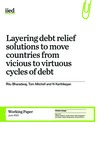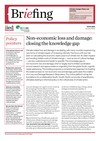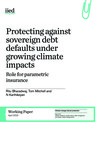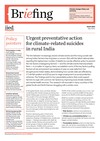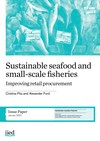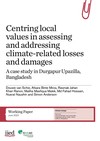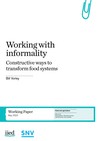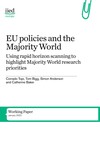IIED's best of 2023: publications
Loss and damage, social protection and debt relief are the buzzwords in IIED’s 10 most downloaded publications this year. We published more than 100 publications, but the top downloads are mostly on these themes.

Covers of IIED's most downloaded publications of 2023 (Image: IIED)
Loss and damage was a phrase used by renowned climate scientist Saleemul Huq frequently in discussions about the climate change impacts on vulnerable countries in the global South.
His death in late October came before the announcement of a Loss and Damage Fund at COP28, a landmark occasion for which he had played a significant role. So it’s appropriate that Huq co-authored a briefing on loss and damage which made it into our top 10 most downloaded publications of 2023.
1. Shock-responsive social protection in fragile and conflict-affected states
Fragile and conflict-affected states (FCAS) are home to nearly one billion people, almost double the number from 20 years ago. Shock-responsive social protection programmes in these states can play a critical role in protecting livelihoods, strengthening adaptive capacity and supporting sustainable development. But FCAS have limited fiscal space, resources and tools/technology to implement these schemes at scale and provide comprehensive cover to all vulnerable populations.
This 34-page working paper published in July discusses the need for debt relief, climate finance support and financial assistance to increase spending on shock-responsive social protection. In addition, they need support to integrate climate information and early warning and anticipatory approaches into planning and decision making at the local level.
More about this work: IIED has developed tools and approaches for existing social protection programmes to help communities better absorb the effects of climate risks, adapt to climate impacts and transform their capacities to address growing climate stresses. Together with partners we’re tackling climate change loss and damage by strengthening anticipatory risk response under social protection programmes.
2. Layering debt relief solutions to move countries from vicious to virtuous cycles of debt
Severe climate impacts are burdening countries worldwide, particularly the least developed countries (LDCs) and Small Island Developing States (SIDS). Each disaster adds to their existing debt, hindering recovery and trapping them in an unsustainable cycle.
This 32-page working paper published in June explores the need to break this cycle through existing debt relief options, covering the link between climate impacts and soaring debts, financing requirements in post-disaster scenarios, analysis of available relief options and the potential of layering different debt and climate finance measures.
More about this work: Adopting a layered approach to debt relief and climate financing can offer LDCs and SIDS the comprehensive support they need to respond to the impacts of climate change and break free from vicious cycles of debt. Ritu Bharadwaj and Tom Mitchell discussed this in a blog, also in June.
3. Non-economic loss and damage: closing the knowledge gap
Climate-related loss and damage is escalating, with many countries experiencing new forms of climate impact, of increasing intensity. The focus until now has been on calculating the economic repercussions of climate risk. Its wider impacts and resulting hidden costs of climate change – such as loss of cultural heritage – are less understood and harder to quantify. This knowledge gap on non-economic loss and damage, which is largely due to limited coordination around research and sparse evidence originating from the global South, urgently needs addressing.
This briefing published in January and co-authored by IIED principal researcher Ritu Bharadwaj, executive director Tom Mitchell and Saleemul Huq, proposes a comprehensive approach for building the evidence base on non-economic loss and damage, particularly the creation of a Loss and Damage Research Observatory. This online platform lays the foundations for a collaborative South–South–North community of practitioners, ultimately leading to informed policy on this critical area of climate action.
More about this work: The Loss and Damage Research Observatory officially launched at COP28 in December. It offers a comprehensive repository of resources, including research papers, methodologies and case studies, fostering a robust learning environment. Additionally, the observatory actively engages with a diverse research advisory group, ensuring rigorous evaluation and dissemination of valuable findings.
4. Protecting against sovereign debt defaults under growing climate impacts: role for parametric insurance
The climate crisis is pushing LDCs into over-indebtedness, amplifying their disparity with developed countries. Fundamental changes are needed to re-engineer, regulate, and equalise global debt and growth.
This 24-page working paper published in April shows that parametric insurance for sovereign debt can be one of the sustainable options for resolving the debt crisis. Insurance could cover debt repayment on behalf of the country during the period of climate crisis, helping them to focus their budget on relief and recovery, with the provision of a global fund to cover the insurance premiums.
More about this work: Every time a disaster strikes, LDCs and SIDS have to take on additional loans on top of pre-existing debt to bring their economies back on track, provide urgent relief, help communities return to some level of normality and restart their economic activities.
As the intensity and frequency of extreme weather events keeps increasing, they are more exposed every year. Each time, their response creates more debt, undermining their capacity to deal with the next crisis.
5. Urgent preventative action for climate-related suicides in rural India
The link between increasingly severe climate events and the rising suicide rate among India’s farmers has long been a concern. But with the latest national data reporting the highest ever number of deaths by suicide, effective action to prevent the risk factors endangering farmers – and the climate events that exacerbate them – is a matter of urgency.
This briefing published in May establishes some of the key factors putting farmers at risk and presents new analysis of year-on-year data from five drought-prone Indian states, demonstrating how suicide rates are affected by rainfall variation and access to wage employment via social protection schemes.
The findings point to four preventative actions that could support farmers to cope with common risk factors by improving local climate resilience and mental health services. This research will resonate in many countries of the global South and North that are struggling with a similar crisis.
More about this work: Periods of below average rainfall leading to drought conditions are driving an increase in the number of farmer suicides in rural India; at the same time, loss and damage from climate change can trigger the erosion of community cohesion and resilience and cause trauma, displacement and danger, especially for the most vulnerable people and groups. We examined some of the impacts of loss and damage in ‘Living in the shadow of loss and damage: uncovering non-economic impacts’.
6. Sustainable seafood and small-scale fisheries: improving retail procurement
Sustainable Development Goal 14.b calls for providing ‘access for small-scale fishers to marine resources and markets’ by 2030. Small-scale fisheries directly support approximately 7% of the global population and make up 47% of the value generated by the seafood industry.
International seafood markets and big retail chains are increasingly important for small-scale fisheries, providing these fisheries with opportunities that can contribute to long-term socioeconomic stability. Through seafood sourcing policies that explicitly commit to supporting small-scale fishers, retailers can make positive contributions to healthier oceans, sustainable fisheries and the wellbeing of coastal communities.
This 38-page issue paper published in January explores retailers’ procurement of small-scale fisheries’ produce, the challenges faced and the opportunities available.
More about this work: In addition to the opportunities retailers provide to small-scale fisheries, philanthropies can also increase small-scale fisheries’ benefits to society. Small-scale fishers and their communities’ knowledge and stewardship are critical for sustainable fisheries management, biodiversity conservation and climate action, and they play a pivotal role in food security and nutrition. Yet small-scale fisheries worldwide are neglected due to lack of data, recognition and investment, and they face extreme risks from inequitable governance, overfishing and climate change.
Philanthropy can provide flexible, patient funds to help local actors implement lasting solutions and showcase what catalytic interventions and thriving communities can look like.
7. Redesigning debt swaps for a more sustainable future
The deal in January 2023 between Cabo Verde and its main creditor Portugal shows that a fresh approach to debt-for-climate-and-nature swaps is possible – and could be key to addressing the ‘triple crisis’ of unsustainable debt, climate change and biodiversity loss.
In this briefing published in March, we outline the approach, which was proposed by IIED in 2020, and highlight six practical lessons that emerged from a pilot with Cabo Verde and Senegal.
IIED’s work on this project is now concluded, but the use of debt swaps for climate and nature has only just begun. We hope that, in sharing experiences from the pilot’s scoping and design process, this briefing will help to inform and encourage other low-income countries interested in exploring the potential of this innovative tool.
More about this work: IIED senior researcher Sejal Patel spoke about debt swaps on various panels throughout COP28 in Dubai. Watch her intervention at the ‘Debt-for-climate swaps as a climate finance instrument’ event on 3 December. And find more information by watching the recording of the ‘Debt-for-climate swaps as an innovative and underused instrument of climate finance?’ event on 10 December.
8. Tracking the money for climate adaptation and disaster risk reduction
The costs of disasters and the negative impacts of climate change are rising globally. Record numbers of extreme weather events, exacerbated by climate change, are already costing the world billions of dollars each year. Other threats, including pandemics, geophysical hazards and cyber risks, are adding to this bill.
This 50-page toolkit published in March zooms in on public finance for climate change adaptation and disaster risk reduction and provides an overview of the latest international and country trends in tagging budgets and tracking public expenditures on climate and disaster resilience.
The paper also suggests a way forward for coordinated climate change adaptation and disaster risk reduction budget tagging and public expenditure tracking for consideration by ministries of finance, planning, environment and climate change, national disaster management agencies and relevant sectors, as well as international development partners engaged in climate and disaster finance.
More about this work: A shared vision is needed for the design and delivery of climate finance models that work effectively to deliver funds for adaptation in LDCs and SIDS. Sejal Patel and Gebru Jember Endalew, technical lead at LIFE-AR, discussed this in a blog from July.
9. Centring local values in assessing and addressing climate-related losses and damages
There is a limited understanding of the intangible and subjective losses and damages from climate change people experience and how to address them. Fortunately, the number of studies explicitly focusing on ‘non-economic’ losses and damages is growing. However, these assessments are commonly shaped by top-down, standardised conceptualisations, resulting in incomplete depictions insensitive to local contexts.
This loss and damage assessment methodology is based on locally identified values, and this 84-page working paper published in June charts how it was applied in Durgapur Upazila to assess and find ways to address the losses and damages people in north-central Bangladesh face from multiple climate-related hazards.
More about this work: Since 2021, IIED has been working with LDCs, SIDS and representatives of vulnerable communities to develop a vision for practical action to address loss and damage caused by climate change. Together we are improving evidence and co-generating pathways to impact.
10. Working with informality: constructive ways to transform food systems
Many people in low-income countries rely on informal food systems for food and livelihoods. But informality puts food systems outside – or partly outside – the governance of states and value chains.
This 32-page working paper published in May explores the challenges involved in reversing decades of underinvestment, and outlines why focusing too closely on formalisation may price out or remove informal food systems – and those who depend on them – from the market. Instead, development organisations engaged in food systems transformation should constructively engage with informal agrifood markets and actors, recognising what informal food systems already do well and focusing on building partnerships based on common cause, to build trust.
More about this work: Food systems are major contributors, but also critically vulnerable, to the triple planetary crisis of climate change, biodiversity loss and pollution. The food sector uses more natural resources than any other sector, which means that the way in which food systems are governed has direct consequences for how natural resources are managed – and for environmental sustainability.
At the recent COP28, leaders signed the UAE declaration on sustainable agriculture, resilient food systems and climate action, affirming that agriculture and food systems must urgently adapt and transform to respond to climate change. IIED’s Tom Mitchell said: "This agreement is a tentative first step in addressing one of the thorniest problems of the climate crisis – our broken food systems.”
Bonus: EU policies and the Majority World
This 32-page working paper published in January reports on a horizon-scanning project undertaken by IIED Europe to help European researchers, policymakers and donors increase their understanding of how the European Union – its policies, member states, institutions and citizens – is influencing development in Majority World countries in Asia, Africa and Latin America.
The project gathered the views of sustainable development experts in the global South and North about the key research priorities for understanding the global impacts of European policy and practice. The paper sets out the aims and methodology of the horizon-scanning project, presents the findings and indicates the next steps.
More about this work: The IIED Europe Global Research Priority Tracker aims to recognise the priorities and increase the impacts of European environment and development policies, research practices and funding in other parts of the world.
This IIED Europe research is a global first for Europe: it is the first time that a pool of experts largely from the Majority World have been asked for their opinion on priority research topics for the EU in a way that is methodologically robust.

